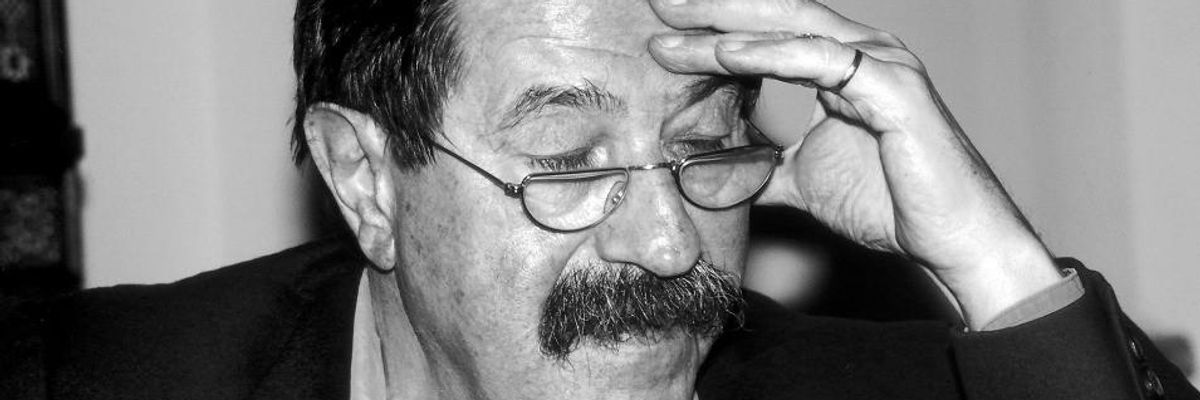
Gunter Grass died April 13, 2015.
(Photo: Elisa Cabot/flickr/cc)
To donate by check, phone, or other method, see our More Ways to Give page.

Gunter Grass died April 13, 2015.
Nobel-award winning author and social critic Gunter Grass, who died this week at the age of 87, said in his final interview that he worried humanity--now 15 years into the 21st century--could be "sleepwalking" into another world war.
"We have on the one side Ukraine, whose situation is not improving; in Israel and Palestine things are getting worse; the disaster the Americans left in Iraq, the atrocities of Islamic state and the problem of Syria," he told the Spanish newspaper El Pais in the interview, which took place at the author's home in northern Germany on March 21 and was published Tuesday, the day after his death.
"There is war everywhere; we run the risk of committing the same mistakes as before; so without realizing it we can get into a world war as if we were sleepwalking," he added, also expressing concern about climate change and overpopulation.
The novelist, poet, playwright, and essayist, who pushed his fellow Germans to confront even the most controversial aspects of their history, was known by some as the "conscience of his generation."
Donald Trump’s attacks on democracy, justice, and a free press are escalating — putting everything we stand for at risk. We believe a better world is possible, but we can’t get there without your support. Common Dreams stands apart. We answer only to you — our readers, activists, and changemakers — not to billionaires or corporations. Our independence allows us to cover the vital stories that others won’t, spotlighting movements for peace, equality, and human rights. Right now, our work faces unprecedented challenges. Misinformation is spreading, journalists are under attack, and financial pressures are mounting. As a reader-supported, nonprofit newsroom, your support is crucial to keep this journalism alive. Whatever you can give — $10, $25, or $100 — helps us stay strong and responsive when the world needs us most. Together, we’ll continue to build the independent, courageous journalism our movement relies on. Thank you for being part of this community. |
Nobel-award winning author and social critic Gunter Grass, who died this week at the age of 87, said in his final interview that he worried humanity--now 15 years into the 21st century--could be "sleepwalking" into another world war.
"We have on the one side Ukraine, whose situation is not improving; in Israel and Palestine things are getting worse; the disaster the Americans left in Iraq, the atrocities of Islamic state and the problem of Syria," he told the Spanish newspaper El Pais in the interview, which took place at the author's home in northern Germany on March 21 and was published Tuesday, the day after his death.
"There is war everywhere; we run the risk of committing the same mistakes as before; so without realizing it we can get into a world war as if we were sleepwalking," he added, also expressing concern about climate change and overpopulation.
The novelist, poet, playwright, and essayist, who pushed his fellow Germans to confront even the most controversial aspects of their history, was known by some as the "conscience of his generation."
Nobel-award winning author and social critic Gunter Grass, who died this week at the age of 87, said in his final interview that he worried humanity--now 15 years into the 21st century--could be "sleepwalking" into another world war.
"We have on the one side Ukraine, whose situation is not improving; in Israel and Palestine things are getting worse; the disaster the Americans left in Iraq, the atrocities of Islamic state and the problem of Syria," he told the Spanish newspaper El Pais in the interview, which took place at the author's home in northern Germany on March 21 and was published Tuesday, the day after his death.
"There is war everywhere; we run the risk of committing the same mistakes as before; so without realizing it we can get into a world war as if we were sleepwalking," he added, also expressing concern about climate change and overpopulation.
The novelist, poet, playwright, and essayist, who pushed his fellow Germans to confront even the most controversial aspects of their history, was known by some as the "conscience of his generation."